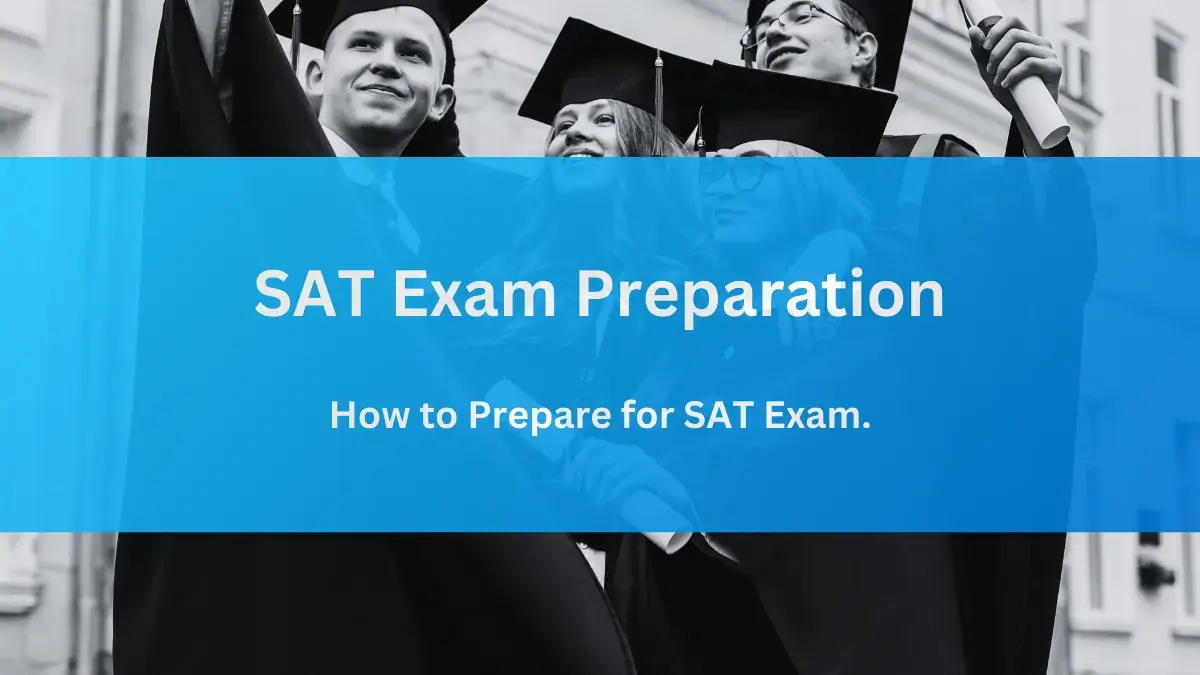SAT Exam Preparation: How to Prepare for SAT Exam
As a high school student who dreams of attending college in the United States, the SAT (Scholastic Assessment Test) will likely be your key to opening that door. You must develop the right skills and strategies to truly shine on this crucial exam. Effective preparation involves combining smart planning with thorough study techniques. Before diving into your SAT exam preparation, it is essential to understand the test format and content. Besides, having a clear understanding of what to expect can boost your confidence. And while staying motivated and focused is crucial, it goes without saying that achieving a high score requires dedication and consistent effort. Leveraging various resources and practice materials will also help you refine your skills. So, let us explore how you can navigate SAT preparation to unlock your full potential and achieve your academic goals!

Understanding the SAT Exam
Before delving into SAT exam preparation strategies, it is essential to grasp the structure and content of the SAT. The exam consists of three main sections: Reading, Math, and Writing and Language. Additionally, there is an optional Essay module. Each section is scored on a scale from 200 to 800, resulting in a total score range of 400 to 1600. It is important to note that the Essay score is separate from the total score.
Reading: The Reading section evaluates comprehension and analytical skills through passages from diverse disciplines such as literature, history, and science. Developing strategies to decode complex texts efficiently and extract key information is pivotal.
Mathematics: In the Mathematics section, proficiency extends from fundamental arithmetic to advanced algebra, data analysis, and problem-solving. Emphasising conceptual understanding alongside procedural fluency enhances readiness for the varied question types encountered. Practice in applying mathematical principles to real-world scenarios further solidifies comprehension and boosts confidence in tackling quantitative problems.
Writing and Language: The Writing and Language section demands precision in grammar, punctuation, and sentence structure precision. A systematic approach to identifying common errors and refining writing mechanics is essential. Integrating vocabulary development through contextual analysis enriches language skills, contributing to effective communication and clarity in written expression.
Optional Essay: Measures your ability to analyse a provided text and construct a well-structured essay.
Importance of Getting a Mentor for SAT Exam Preparation
If you struggle with specific subjects or find it challenging to study independently, guidance from a mentor can provide clarity. A qualified SAT mentor can help optimise study time, offer personalised guidance, and provide insights into the exam format and scoring criteria. Mentors at IMS, for instance, are experienced in SAT preparation and can impart valuable tips and strategies to tackle difficult questions effectively.
Creating a Comprehensive Study Plan
A well-structured study plan is crucial for effective SAT exam preparation. Here are vital steps to consider:
- Sit a Diagnostic Test: Before starting your preparation, taking a diagnostic test helps assess your initial strengths and weaknesses across SAT sections. This enables you to tailor your study sessions effectively with the guidance of your mentor.
- Set Achievable Goals: Based on your diagnostic test results, set realistic goals that can be achieved within a specified timeframe. Breaking down long-term goals into manageable milestones allows you to track progress effectively and stay motivated.
- Allocate Regular Study Time: Consistency is key. Allocate dedicated study time each week for SAT preparation. Regular practice helps retain information and improve skills over time.
- Take Practice Tests: Integrating regular mock tests into your study plan is essential. Practice tests simulate actual test conditions and help you gauge your progress, identify areas of improvement, and refine your test-taking strategies.
Utilising Official SAT Resources
In addition to mentorship, leveraging official resources enhances SAT exam preparation:
- Official SAT Study Guide: Includes practice tests, sample questions, and detailed explanations.
- SAT Practice Tests: Available on the College Board website, these tests mirror the actual SAT exam format and provide a realistic assessment of readiness.
- Online Tools and Resources: Utilize free or paid SAT practice questions and personalised study plans available through various online platforms.
Developing Effective Test-Taking Strategies
In addition to mastering content knowledge, the implementation of effective test-taking strategies can significantly enhance SAT performance:
- Time Management: Due to the SAT’s time constraints, honing the skill of time management through structured practice sessions is crucial.
- Error Analysis: It is advisable to maintain an error log to document and analyse mistakes encountered during preparation systematically. This practice facilitates the identification of recurring patterns and fosters the enhancement of logical reasoning abilities.
- Educated Guessing: It is essential to develop systematic approaches to making informed guesses on challenging questions. The SAT does not penalise incorrect answers, encouraging strategic risk-taking in uncertain scenarios.
Seeking Support When Needed
When facing challenges, do not hesitate to seek support:
- Consult Your Mentor(s): Discuss challenging concepts and questions with your mentor to gain insights and clarity.
- Join Study Groups: Collaborate with peers preparing for the SAT to review and discuss study materials. Group learning can provide motivation and a deeper understanding of complex topics.
- Attend Review Classes: Take advantage of review sessions offered by online platforms or coaching centres. These sessions often highlight targeted strategies and provide additional practice.
Prioritising Health and Well-being
Achieving peak performance on the SAT necessitates a holistic approach encompassing cognitive readiness, emotional resilience, and physical well-being.
- Balance Your Schedule: Balancing rigorous study schedules with adequate rest, nutrition, and exercise supports optimal cognitive function, enhancing focus, memory retention, and overall academic performance.
- Prioritise Mental Health: Prioritising mental health through stress management techniques such as mindfulness and relaxation exercises mitigates test-related anxiety, fostering a conducive mindset for effective problem-solving and decision-making during the exam.
- Encourage Knowledge Sharing: Cultivating a supportive environment within study groups or peer networks promotes collaborative learning, encouraging knowledge sharing, and mutual encouragement among peers preparing for the SAT.
FAQs
What is the importance of mentorship in SAT exam preparation?
Navigating the complexities of SAT exam preparation can be daunting, especially for students facing challenges in specific subjects or struggling with self-directed study. Several reasons make the presence of a mentor necessary. Some of the reasons are stated below.
- Personalised Guidance: A knowledgeable SAT mentor can assess your strengths and weaknesses through diagnostic tests and tailor a study plan to address your specific needs.
- Strategic Planning: Mentors provide valuable insights into the SAT exam format, content, and scoring criteria. They can help you devise effective study strategies and time management techniques to optimise your preparation.
- Motivation and Accountability: Working with a mentor provides accountability and motivation. Regular check-ins and progress assessments keep you on track toward achieving your target score.
- Expert Tips and Resources: Experienced mentors often have access to specialised resources and practice materials that simulate the SAT environment, allowing you to familiarise yourself with the test format and build confidence.
How do I make use of official SAT resources in the best possible manner?
Optimising preparation involves leveraging authoritative SAT resources endorsed by the College Board. The Official SAT Study Guide serves as a cornerstone, offering authentic practice tests with detailed explanations of the answers. Familiarising oneself with the test’s formatting and question styles through these resources is indispensable for honing test-taking strategies and building endurance for the exam’s duration. Supplementing the Study Guide, official SAT Practice Tests available on the College Board website provide invaluable benchmarks for measuring progress and identifying areas necessitating further review. Analysing performance metrics from these tests enables targeted refinement of weak areas and consolidation of strengths, thereby enhancing overall readiness.
How do I strategically prepare for the SAT exam?
Effective test-taking strategies are not just about knowing the material; they are about understanding how to navigate the test itself. First and foremost, time management is crucial. Since the SAT is a timed test, practice managing your time effectively during practice sessions. This means pacing yourself to ensure you complete each section within the allotted time, avoiding the trap of spending too much time on any one question. Another important strategy is error analysis. Keeping an error log where you document mistakes during practice sessions can be incredibly helpful. By reviewing this log, you can spot patterns in your errors, understand why you got a question wrong, and learn how to avoid similar mistakes in the future. This systematic approach helps improve your critical thinking and problem-solving skills. Finally, do not underestimate the power of educated guessing. The SAT does not penalise for wrong answers, so making an informed guess is better than leaving a question unanswered.
What does a holistic approach to SAT prep look like?
Preparing for the SAT goes beyond just studying the material; it involves caring for your overall well-being. Balancing your schedule is critical. Create a study plan that includes regular study sessions but also allows time for breaks, rest, exercise, and hobbies. This balance helps keep your mind fresh and reduces the risk of burnout. Living a healthy lifestyle is another crucial aspect. Maintaining a nutritious diet, regular exercise, and ensuring enough sleep can significantly impact your brain function and overall performance. Your body and mind need to be in good shape to handle the demands of SAT exam preparation. Mental health, of course, should also be made a priority. Managing stress through techniques like mindfulness, meditation, or simply taking time to relax can help keep anxiety at bay. If you feel overwhelmed, do not hesitate to reach out to friends, family, or a counsellor for support.





